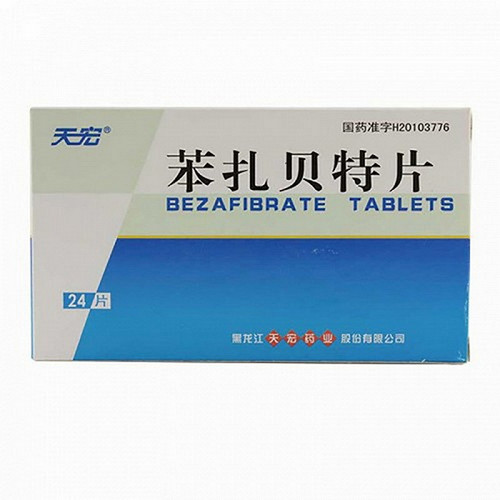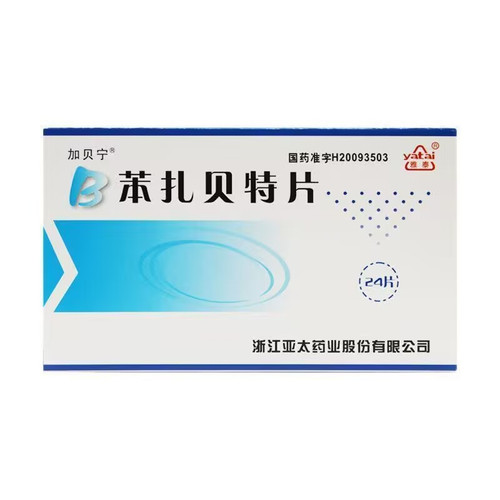Product Overview
[Drug Name]
Generic Name: Bezafibrate Tablets
Trade Name: Abeita
English Name: Bezafibrate Tablets
Chinese Pinyin: Benzhabeite Pian
[Ingredients]
[4-Chlorobenzoyl-β-aminoethylphenoxy]isobutyric acid
[Properties]
This product is a film-coated tablet. When the film coating is removed, it appears white or off-white.
[Indications]
For the treatment of hypertriglyceridemia, hypercholesterolemia, and combined hyperlipidemia.
[Dosage and Administration]
Usual Adult Dosage:
1. Take bezafibrate tablets orally, 200-400 mg three times daily. It can be taken with or after meals. For patients with optimal efficacy, the maintenance dose can be 400 mg twice daily. In case of renal impairment, the dose should be adjusted according to creatinine clearance: 40-60 ml/min, 400 mg twice daily; 15-40 ml/min, 400 mg once daily or every other day; below 15 ml/min, 400 mg once every three days.
2. Oral bezafibrate extended-release tablets: One tablet once daily. Reduce to half a tablet daily or every other day in case of renal impairment.
[Adverse Reactions]
1. The most common adverse reactions are gastrointestinal discomfort, such as indigestion, anorexia, nausea, vomiting, fullness, and stomach discomfort. Other less common adverse reactions include headache, dizziness, fatigue, rash, itching, impotence, anemia, and decreased white blood cell count. 2. Occasionally, cholelithiasis or myositis (myalgia, fatigue) may occur. This product is a clofibric acid derivative and may cause myositis, myopathy, and rhabdomyolysis, leading to elevated blood creatine phosphokinase. Rhabdomyolysis may occur, primarily manifested by myalgia accompanied by elevated creatine phosphokinase and myoglobinuria, and may lead to renal failure, but this is rare. The risk of myopathy is increased in patients with nephrotic syndrome or other renal impairment leading to hypoalbuminemia, or in patients with hyperthyroidism. 3. Rarely, elevated serum aminotransferases may occur.
[Contraindications]
1. This product is contraindicated in patients with allergies to bezafibrate. 2. This product is contraindicated in patients with gallbladder disease or cholelithiasis, as it may exacerbate gallbladder disease symptoms. 3. This product is contraindicated in patients with hepatic insufficiency or primary biliary cirrhosis. 4. This product is contraindicated in patients with severe renal insufficiency, as it may cause rhabdomyolysis and severe hyperkalemia. It is also contraindicated in patients with hypoalbuminemia caused by nephrotic syndrome, as it increases the risk of myopathy.
[Precautions]
1. This product may interfere with diagnosis. ① Decreased hemoglobin and white blood cell counts may occur. ② Elevated serum aminotransferases may occur. ③ Increased serum creatinine may occur. 2. Regular checks should be performed during medication: ① Complete blood count and platelet count; ② Liver and kidney function tests; ③ Blood lipids; ④ Blood creatine phosphokinase. 3. If cholelithiasis, significant liver function abnormalities, suspected myopathy symptoms (such as myalgia, tenderness, fatigue), or a significant increase in blood creatine phosphokinase develop after medication, the medication should be discontinued. 4. While treating hyperlipidemia, it is also important to monitor and treat underlying conditions that may cause hyperlipidemia, such as hypothyroidism and diabetes. Certain medications, such as estrogens, thiazide diuretics, and blockers, can also cause hyperlipidemia. After discontinuation of these medications, corresponding anti-hyperlipidemic treatment is no longer necessary. 5. Dietary therapy remains the primary treatment for hyperlipidemia. Combined with exercise and weight loss, it is superior to any other form of drug therapy.
[Use in Special Populations]
Precautions for Children:
The efficacy and safety of this product in children have not yet been confirmed by experimental studies, so it is not recommended for use.
Precautions for Pregnancy and Lactation:
The safety of this product during pregnancy has not been established, so its use is not recommended for pregnant women. It is unknown whether this product is secreted into breast milk, so it should not be taken by breastfeeding women.
Precautions for Elderly Patients:
The dosage should be adjusted according to the liver and kidney status of the elderly. If renal dysfunction occurs, the dosage should be appropriately reduced.
[Drug Interactions]
If you are currently taking other medications, consult your physician or pharmacist before using this product.
[Pharmacological Actions]
This product is a clofibric acid derivative, a lipid-regulating drug. It has two mechanisms of action: first, it increases the activity of lipoprotein lipase and hepatic lipase, promoting the breakdown of very low-density lipoprotein (VLDL), thereby lowering blood triglyceride levels. Second, it reduces the secretion of VLDL. This product lowers both LDL and cholesterol, possibly by enhancing the clearance of receptor-bound LDL. This product has a stronger effect on lowering blood triglycerides than on cholesterol, and also increases high-density lipoprotein cholesterol. It also has the potential to lower blood fibrinogen. Existing studies have not found this product to be carcinogenic or mutagenic.
Storage: Store in a cool, dark, and airtight place.
Specifications: 0.2g
Packaging: 0.2g x 20 tablets
Expiry Date: 24 months
Approval Number: National Medicine Standard H20010013
Manufacturer: Jiangsu Tasly Diyi Pharmaceutical Co., Ltd.






